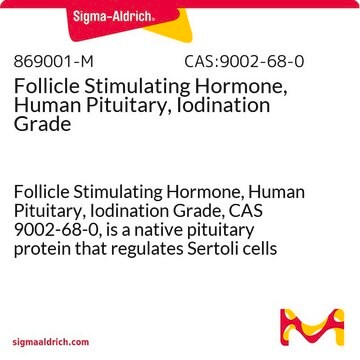O6503
L-Ornithine monohydrochloride
BioReagent, suitable for cell culture, ≥99%
Synonym(s):
(S)-2,5-Diaminopentanoic acid monohydrochloride
About This Item
Recommended Products
biological source
microbial
Quality Level
product line
BioReagent
Assay
≥99%
form
powder
packaging
pkg of 100 g
pkg of 25 g
technique(s)
cell culture | mammalian: suitable
impurities
ammonia and citrulline, essentially free
solubility
H2O: soluble 50 mg/mL, clear, colorless to very faintly yellow
SMILES string
Cl.NCCC[C@H](N)C(O)=O
InChI
1S/C5H12N2O2.ClH/c6-3-1-2-4(7)5(8)9;/h4H,1-3,6-7H2,(H,8,9);1H/t4-;/m0./s1
InChI key
GGTYBZJRPHEQDG-WCCKRBBISA-N
Looking for similar products? Visit Product Comparison Guide
General description
Application
- as a supplement in Dulbecco′s modified eagle medium (DMEM) for cell growth assays
- as a component in the standard medium for primary human hepatocytes (PHH) culture
- as a creatine synthesis inhibitor
Biochem/physiol Actions
Other Notes
Storage Class Code
11 - Combustible Solids
WGK
WGK 1
Flash Point(F)
Not applicable
Flash Point(C)
Not applicable
Personal Protective Equipment
Certificates of Analysis (COA)
Search for Certificates of Analysis (COA) by entering the products Lot/Batch Number. Lot and Batch Numbers can be found on a product’s label following the words ‘Lot’ or ‘Batch’.
Already Own This Product?
Find documentation for the products that you have recently purchased in the Document Library.
Customers Also Viewed
Articles
Discover L-ornithine, an important amino acid supplement, explore how L-ornithine is used in CHO and iPSC culture, and discover how poly-L-ornithine is used to enhance cell attachment.
Discover L-ornithine, an important amino acid supplement, explore how L-ornithine is used in CHO and iPSC culture, and discover how poly-L-ornithine is used to enhance cell attachment.
Discover L-ornithine, an important amino acid supplement, explore how L-ornithine is used in CHO and iPSC culture, and discover how poly-L-ornithine is used to enhance cell attachment.
Discover L-ornithine, an important amino acid supplement, explore how L-ornithine is used in CHO and iPSC culture, and discover how poly-L-ornithine is used to enhance cell attachment.
Our team of scientists has experience in all areas of research including Life Science, Material Science, Chemical Synthesis, Chromatography, Analytical and many others.
Contact Technical Service









